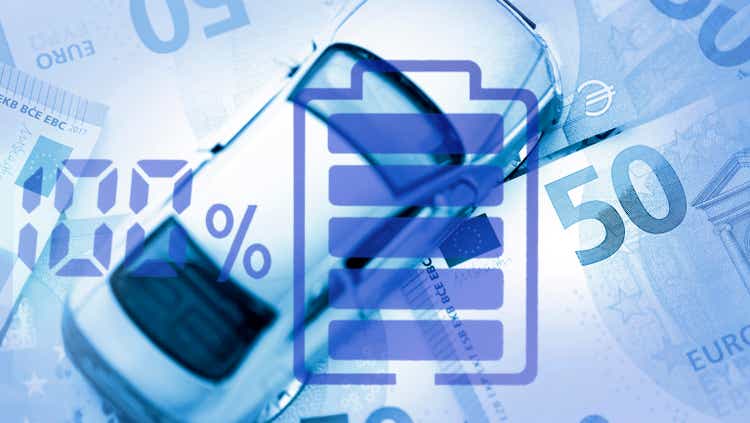deepblue4you/iStock via Getty Images
The $430B Inflation Reduction Act passed by Congress includes new rules governing the electric vehicle industry. The most dramatic is that the current $7,500 EV tax credit will be replaced by incentives designed to bring more battery and EV manufacturing into the U.S..
Crucially, electric vehicles assembled outside North America will not qualify for the EV tax credit. By some estimates that is about 70% of the current EV and plug-in hybrid market. While the rules governing raw materials, supply chains and manufacturing partnerships are still unclear, the Alliance for Automotive Innovation has warned in general that the change could cut into EV sales goals.
Audi (OTC:AUDVF), Kia Motors (OTCPK:KIMTF) and Porsche (OTCPK:POAHY) have already stated that buyers of their electric vehicles will not qualify for the tax credit, while Volkswagen (OTCPK:VLKAF) said it will have to work out how to make the ID.4 eligible next year. Higher-priced EVs from Tesla (NASDAQ:TSLA), Fisker (FSR), and Lucid Group (LCID) also will not qualify for the EV tax credit. The cap to qualify is $55K for sedans and $80K for SUVs and trucks.
There is also the question of how regulators will view Chinese companies like CATL in the context of the tax credit if they were to build factories in the U.S. and supply EV manufacturers.
Looking at the flip side of the EV industry reset, the potential winners from the new EV tax rules could include Tesla (TSLA) and General Motors (GM) without a total vehicle cap in place and with their domestic supply chains much more advanced. However, the auto giants still have to derive 40% of battery minerals from North America or nations with which the U.S. has free trade agreements to make those advantages work out.
The upside may be more clear for commercial electric truck makers with the proposed incentives of up to $40,000 per vehicle providing strong motivation for fleets to look at Daimler’s (OTCPK:DTRUY) Freightline Cascasia, Lion Electric’s (LEV) Class 8 trucks, the Tesla Semi, Workhorse Group’s (WKHS) medium-duty trucks, and others as fleet options. The tax credit for commercial fuel cell vehicles is set at 30% of the price or $40,000, whichever is lower.
Digging in even deeper, expect to see some auto suppliers viewed more favorably as their place in the domestic EV supply chain is analyzed more closely. On Friday, stocks with big gains included Allego (ALLG), Foresight Autonomous (FRSX), Luminar Technogies (LAZR), Modine Manufacturing (MOD), and QuantumScape (QS).
One of the first CEOs from the electric vehicle industry to weigh in on the legislation was Rivian Automotive’s (RIVN) R.J. Scaringe who took the long view on the upside.
“I think with regards to the Inflation Reduction Act, this is, as I commented earlier, this is a really important step and I think it’s great for the acceleration of electrification and really providing a path to a carbon-neutral economy. Now in terms of what that represents for us, it’s certainly a powerful tailwind… The incentives are quite strong, the consumer-facing incentives at over – at $40,000. So the – we see this as really helping to drive a rapid transition to electric vehicles in the commercial space.”
Read the full Rivian Automotive earnings call transcript.
Image and article originally from seekingalpha.com. Read the original article here.

